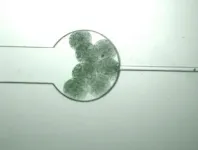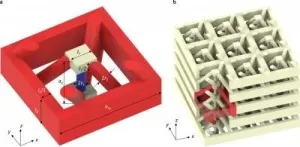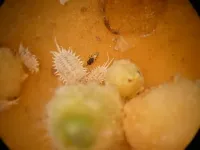Three factors may predict college students' loss of self-control, WVU study finds
The study, 'Predictors of initial status and change in self-control during the college transition,' observed 569 first-year students ages 18-19 at five points over the course of the academic year
2021-06-10
(Press-News.org) MORGANTOWN, W. Va.-- Joining a club that sparks a new interest, playing a new intramural sport or finding a new group of friends may be just as indicative of a college freshman's loss of self-control as drinking or drug use, according to new research at West Virginia University.
Self-control--the ability to exercise personal restraint, inhibit impulsivity and make purposeful decisions--in that first year partly depends on a student's willingness to try new things, including things adults would call "good."
That's a new finding, according to Kristin Moilanen, associate professor of child development and family studies. The study, "Predictors of initial status and change in self-control during the college transition," observed 569 first year students ages 18-19 at five points over the course of the academic year. Participants completed the first wave of the study two weeks before arriving on campus and the other four over the course of the year.
The tendency to try new things is one of two indicators--the other is maternal attachment--that may gauge which students would benefit from an intervention, the study found.
"It does suggest that one of the points of college is to go out and try new things," she said. "There may be some value in finding out who needs reining in or training in decision making that they need to slow down and think."
Students who were less interested in trying new things maintained stable control throughout the year, she said.
A first-year student's self-control tendencies also depend on the students' attachment to their parents, particularly their mothers.
"They're responsive," she continued. "They tend to get along, their relationship is predictable and they know what their parents are going to do, how they're going to react. They don't hide their mistakes from their parents."
Conversely, students who were detached from their parents were more likely to tread more dangerous behavioral waters.
Moilanen said that stems from parents who were unavailable or inconsistent, making their children tend to push other people away and dismiss the importance of parental attachment.
"Their self-control erodes more than those who are more securely attached," she said.
Screening for insecure attachment and personality dimensions may be valuable for identifying first year college students who could benefit from discrete targeted early interventions, particularly those who aren't as attached to their mothers; those student may benefit from connecting with peers and building a support system, according to the study.
A third factor, stress, is also likely to blame for college freshmen's loss of self-control, though this was not considered in the study.
"It's probably reflecting fluctuations in stress over the academic year," Moilanen said. "First year students don't have the most accurate representation for what to expect and then they get here and they find that it's fun, but they also find it's stressful."
Stressors, even small ones, Moilanen said, can be more disruptive to self-control than people realize.
Co-authors of the study included Amy Gentzler and Nicholas Turiano, both faculty in the WVU Department of Psychology, and former WVU graduate students Katy DeLong and Shantel Spears.
INFORMATION:
[Attachments] See images for this press release:

ELSE PRESS RELEASES FROM THIS DATE:
2021-06-10
DURHAM, N.C. - Biomedical engineers at Duke University have demonstrated that a class of interwoven composite materials called semi-interpenetrating polymer networks (sIPNs) can be produced by living cells. The approach could make these versatile materials more biologically compatible for biomedical applications such as time-delayed drug delivery systems.
The research appears online on June 8 in the journal Nature Communications.
The concept of sIPNs has been around for more than 100 years and has been used in automotive parts, medical devices, molding compounds and engineering plastics. The general idea is for one or more polymers to assemble around another polymer scaffold in such a way that they become interlocked. Even though ...
2021-06-10
Humans expect that AI is Benevolent and trustworthy. A new study reveals that at the same time humans are unwilling to cooperate and compromise with machines. They even exploit them.
Picture yourself driving on a narrow road in the near future when suddenly another car emerges from a bend ahead. It is a self-driving car with no passengers inside. Will you push forth and assert your right of way, or give way to let it pass? At present, most of us behave kindly in such situations involving oth-er humans. Will we show that same kindness towards autonomous vehicles?
Using methods ...
2021-06-10
As COVID-19 restrictions ease nationwide and more people host indoor gatherings, investing in a high efficiency particulate air (HEPA) purifier might not be a bad idea, says a University of Cincinnati College of Medicine researcher.
Several published studies evaluating aerosols and submicron particles similar in size to the SARS-CoV-2 virion have shown that portable HEPA purifiers are able to significantly reduce airborne COVID-19 particles, says Ahmad Sedaghat, MD, PhD, director of the UC Division of Rhinology, Allergy and Anterior Skull Base Surgery.
Sedaghat identified the medical literature showing published studies on the effectiveness ...
2021-06-10
Acoustic waves in gases, liquids, and solids usually travel at an almost constant speed of sound. So-called rotons are an exception: their speed of sound changes significantly with the wavelength, and it is also possible that the waves travel backwards. Researchers at Karlsruhe Institute of Technology (KIT) are studying the possibilities of using rotons in artificial materials. These computer-designed metamaterials, produced by ultra-precise 3D laser printing, might be used in the future to manipulate or direct sound in ways that have never been possible before. A report on the researchers' work has been published in Nature Communications. (DOI: 10.1038/s41467-021-23574-2)
Rotons are quasiparticles, which means that they behave ...
2021-06-10
New Orleans, LA - Research conducted at LSU Health New Orleans Neuroscience Center of Excellence reports that Elovanoids, bioactive chemical messengers made from omega-3 very-long-chain polyunsaturated fatty acids discovered by the Bazan lab in 2017, may block the virus that causes COVID-19 from entering cells and protect the air cells (alveoli) of the lung. Their findings are published online in Scientific Reports, available here.
"Because the compounds are protective against damage in the brain and retina of the eye and the COVID-19 virus clearly damages the lung, ...
2021-06-10
Fraud is going uninvestigated by police who are "hiding behind the veil" of the Action Fraud national crime reporting agency.
In his paper published this week in Policing, Professor Mark Button, director of the Centre for Counter Fraud Studies at the University of Portsmouth argues that, Action Fraud, which has been widely derided, has become a useful veil from which the police can hide their inadequate response.
Figures from Action Fraud, the arm of the police responsible for recording scams and fraud, show that between 2019 and 2020, over 800,000 people reported being a victim of fraud, with £2.3bn finding its way into criminal hands. However, Professor Button calculated just 0.6 per cent of police officers ...
2021-06-10
For two decades, the number of Americans who die each year from drug overdoses has steadily risen, from less than 20,000 in 1999 to more than 80,000 in 2020. By studying patterns of these drug-related fatalities, researchers at University of California San Diego School of Medicine, San Diego State University (SDSU), and international collaborators have designed and validated a prediction model to signal counties at risk of future overdose death outbreaks. The goal of the open-source tool is to predict and prevent deaths through early deployment of public health resources.
Findings were published June 9, 2021 by Lancet Public Health.
"A big challenge for public health experts is figuring out which parts of the country are at greatest risk of ...
2021-06-10
WASHINGTON -- In a new study, researchers show that the fiber optic cables that carry data across the world's oceans can also be used to sense geophysical events and monitor ocean and seafloor conditions.
Although buoys and cabled observatories can be used to monitor parts of the ocean, the information they provide is limited to their immediate surroundings. The new approach could offer a way to use the global network of subsea fiber optic cables to study otherwise inaccessible parts of the ocean.
"Once perfected, this new technique will allow geophysical sensing in the ocean depths, which are largely unexplored because of a lack of instrumentation that works in this environment," said Zhongwen Zhan, assistant professor of geophysics at Caltech. ...
2021-06-10
A CABI-led study has revealed that the success of Classical Biological Control (CBC) in Europe, North Africa and the Middle East is only rarely dependent on the released biological control agent, but more often on other factors, such as the target pest, its host plant, or the circumstances of the releases.
The research - published in the journal NeoBiota - suggests that the overall success of biological control introductions of insect predators and parasitoids against herbivorous insects in the Western Paleartic ecozone is comparable to the success of CBC worldwide. However, over 100 years of CBC in this region, has resulted in no overall rise in success in the fight against insect pests - including those of crops such as citrus, olive, potato, ...
2021-06-10
The COVID-19 pandemic has made clear the importance of understanding precisely how diseases spread throughout networks of transportation. However, rigorously determining the connection between disease risk and changing networks--which either humans or the environment may alter--is challenging due to the complexity of these systems. In a paper publishing on Thursday in the END ...
LAST 30 PRESS RELEASES:
[Press-News.org] Three factors may predict college students' loss of self-control, WVU study finds
The study, 'Predictors of initial status and change in self-control during the college transition,' observed 569 first-year students ages 18-19 at five points over the course of the academic year







